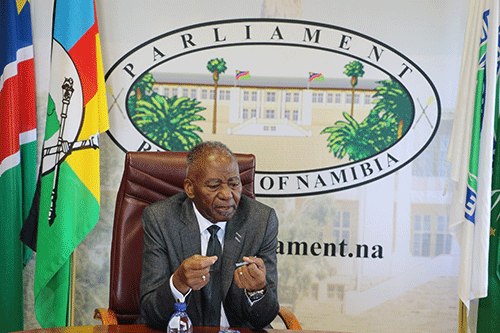George Sanzila
Speaker of the National Assembly Peter Katjavivi has revealed that members of parliament from both Russia and Ukraine have committed themselves to engage in dialogue meant to resolve the protracted conflict between the two countries. Members of parliament showed their willingness to participate in dialogue during a meeting with the Inter-Parliamentary Union (IPU) Task Force on the margins of the just-ended 145th IPU Assembly that was held in Kigali, Rwanda.
A resolution on Ukraine titled “Condemnation of the invasion of Ukraine and of the subsequent annexation of territories in defence of the territorial integrity of all states”, was adopted during the assembly, further reinforcing support for the role of mediation being played by the task force.
Katjavivi is among members of parliament who have been appointed to serve on the newly- formed IPU task force.
The Namibian Speaker, together with his South African counterpart Nosiviwe Mapisa-Nqakula, are the only African Speakers who serve on the committee, with Katjavivi as vice president.
The conclusion of the assembly further saw the adoption of the “Kigali Declaration on Gender equality and Gender-sensitive parliaments as drivers of change for a more resilient and peaceful world”.
The declaration calls for gender quotas and gender-responsive budgeting in IPU member parliaments.
The African Gender Index report which was launched in 2019 at the Fourth Global Gender summit held in the same city of Kigali revealed that Namibia had achieved over 79% gender parity.
The latter report is aimed, amongst other things, to measure how women are progressing alongside their male counterparts in three areas, namely economic, social and political representation. Namibia is also among the highly-ranked countries in the world by the IPU in terms of female representation in parliament.
According to Katjavivi, Namibia has made inroads into gender equality, and parliament has so far achieved over 46% women representation. “I am pleased to report that in our parliament, inclusive of both chambers, women currently constitute 46.88% of the members.
This was primarily achieved through a political decision taken by the governing Swapo party. The party introduced the conceptual ‘zebra list’ in its efforts towards achieving the SADC protocol on gender and development, which aims for 50/50 representation in all government and political positions,” the Speaker told delegates during the assembly.
He, however, cautioned against complacency, noting that despite the achievements, Namibia still experiences comparatively high income inequality across all genders.
He implored other parliaments to strengthen their efforts meant to improve gender representation in their respective countries.
“Gender inclusivity should be our collective pre-occupation as members of our robust organisation, the IPU. Despite the achievements, there is room for each IPU member state to do more so as to be drivers for change for gender parity. It is significant that we are gender-sensitive parliaments, who endorse budgets that are meant to protect and empower the girl child and promote youth inclusion,” appealed Katjavivi.
He also held several bilateral meetings with his Serbian, Georgian and Ghanaian counterparts, Vladimir Orlic, Shalva Papuashvili and Alban Kingsford Sumana Bagbin, respectively, meant to promote cooperation.
Speaker Katjavivi led a delegation of six members of parliament to the assembly, where over 1 000 delegates were congregated, including 60 Speakers and Deputy Speakers.
The IPU Assembly is a global organisation of parliaments which brings together lawmakers to identify international challenges and make recommendations for action.



